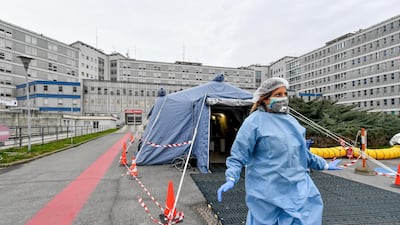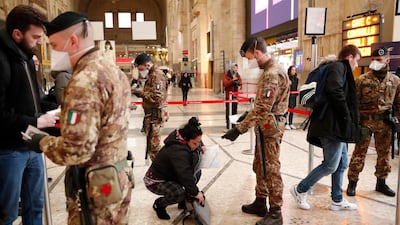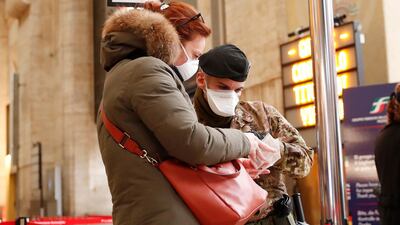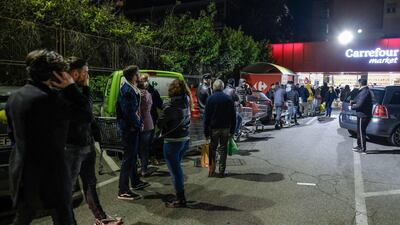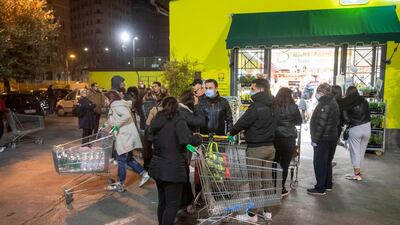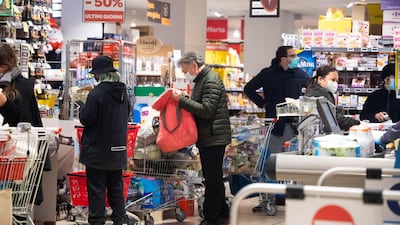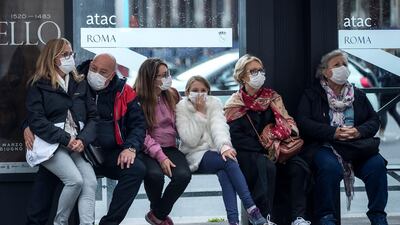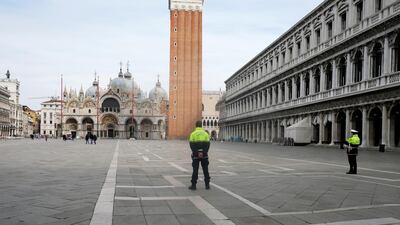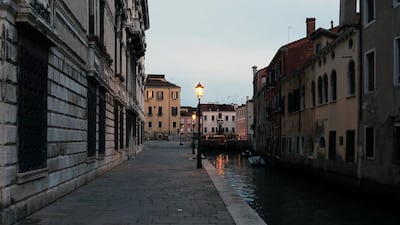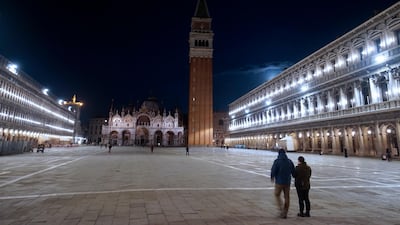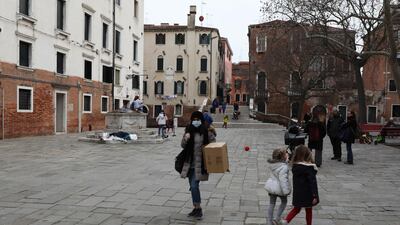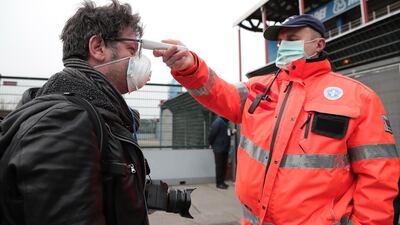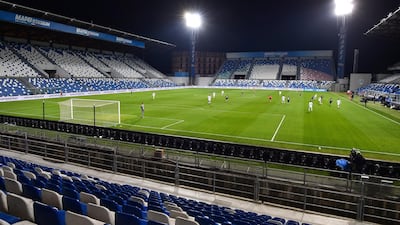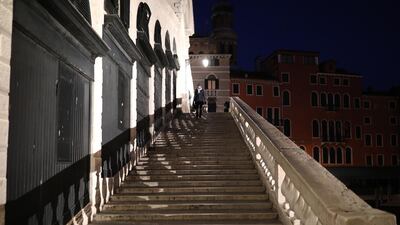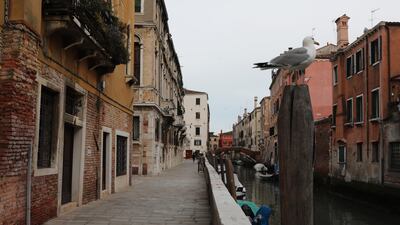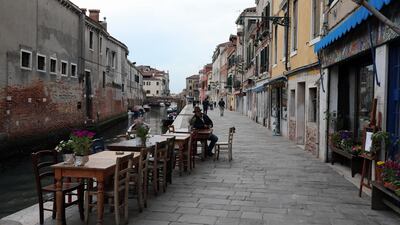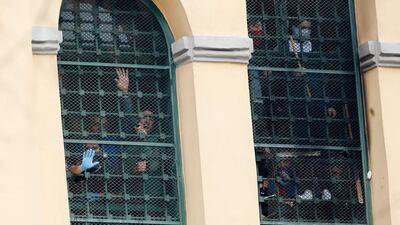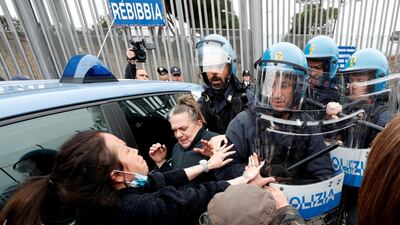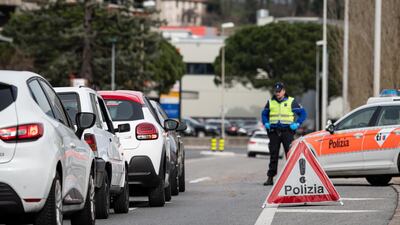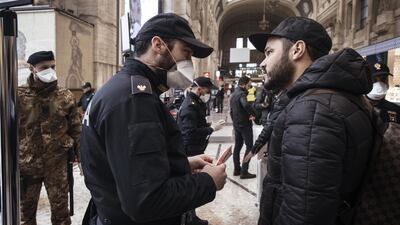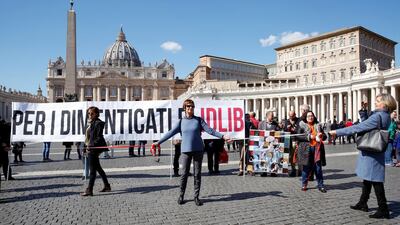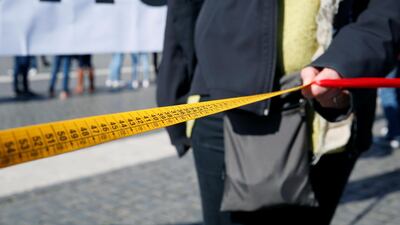At 79 years of age, Elsa Doria has seen floods and other natural disasters hit her native Venice but through it all the city of canals has remained a global magnet for tourism.
But as the panic over the coronavirus empties its gondolas and restaurants, Ms Doria fears that bad management of the crisis by Italian politicians has finally managed what the weather could not.
“They made it seem as if we were the infectors of Europe," she said.
"The difference is that we Italians are doing a lot of screenings while Germans and French aren’t."
The Rialto Bridge, one of Venice’s landmarks, is usually as congested as the train station but both are deserted.
In the few open shops, clerks are tidying up or chatting on their mobile phones. St Mark’s Square is almost empty, too.
“What will kill Venice is not the coronavirus, it’s the economic crisis," a souvenir seller said. "It’s a psychosis fuelled by the media.”
The man does not yet know that in a few hours the government will block the entire Lombardy region and 14 other provinces, including Venice.
Venice hotel manager Luca, who spoke to The National by phone, is glum.
“Even before the government’s decision I was receiving a wave of cancellations," he said. "Now my hotel is almost empty. I really don’t know how we will get out of this crisis."
In Piazza San Marco, Mattia Pivetta, a computer consultant from nearby Treviso, backs the quarantine measures.
“It’s crucial to stop the virus from spreading further,” Mr Pivetta said.
His fiancee, Camille Depassio, is a French teacher from Lyon, who is getting used to the disruption.
“Since the end of February I’ve been teaching long-distance classes," Ms Depassio said.
Like the few other tourists, they seem to enjoy the peace of the square in all its splendour.
But Cristian Boscolo, a gondolier dressed in the typical black and white hooped T-shirt, is worried.
“We’ve never had so few tourists," Mr Boscolo said. "This is worse than after 9-11 or the Gulf War. I lost practically 90 per cent of the clients.”
He shrugs his shoulders. Like thousands of other fellow citizens, he works in tourism, an industry that is crucial for the prosperity of the historic city of Venice.
The city on the water, with its Lido, is one of the most popular destinations in the world but on this sunny Saturday morning, you hardly see anyone around.
Northern Italy’s coronavirus crisis has hit the province of Venice hard.
There are few tourists anywhere, just some Italians from nearby areas and a few young European and Asian couples who did not feel like cancelling holidays that had already been paid for and might not be refunded.
Laura Sanchez comes from the north of Peru and is a clerk in a kiosk near the train station. She says no one is buying her souvenirs.
“Plus, you know, the locals are few and mostly old and they hardly leave their home these days," Ms Sanchez said.
"There were four of us working in this kiosk, now I’m the only one left."

The foreign newspapers – British, German and American – remain unsold on the counter.
In 2017, there were 512 tourists a day for each square kilometre in Venice. Now the streets are half empty.
Almost all Asians wear a mask and walk quickly, while the Germans and the Britons stop to take pictures with no hurry. It is a real luxury for a hectic city such as Venice.
Not far from the station, there is Sohag Islam’s bar. He is 25 years old and comes from Bangladesh.
His bar is nice and cosy. Customers can enjoy espresso, cappuccino, spritz or Venice-typical potato croquettes.
“On a Saturday it should be crowded," Mr Islam said. "I've borrowed money to start my own business but now it’s at zero.
“Last November we were hit by floods, now this. The Carnival was a chance to recover from the losses but they stopped it because of the coronavirus.
"The bills come even though you’re not making any money. And now I’m having trouble paying rent on my house.”
The severe floods in winter caused billions of dollars in damage to its cultural heritage and businesses.
The coronavirus risks being the coup de grace to an increasingly old city, from which more and more Venetians have been moving to nearby Mestre, Milan or the rest of Italy.

Yet some Venetians remain positive and hopeful. Margherita Rossetto, a ceramic decorator, says she has been working in Venice since the fall of Berlin Wall.
“It’s true, these days there are fewer tourists, but they'll be back," Ms Rossetto said. "I’ve overcome all of the crises in this city. This one will pass, too.”
But Ms Doria regards it as another downward step in the decline of Venice as a living city. She also worries about the long-term departure of Venetians.
“It is difficult remaining in Venice," she said. "It takes incentives to help young couples to stay here but no administration has solved the problem of house costs.
“Everywhere is full of closed apartments. I live in an 18th century building with eight apartments and only now, after years, we have a baby in the building.”

